
All categories
Featured selections
Trade Assurance
Buyer Central
Help Center
Get the app
Become a supplier

(3500 products available)



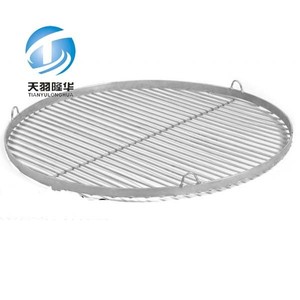

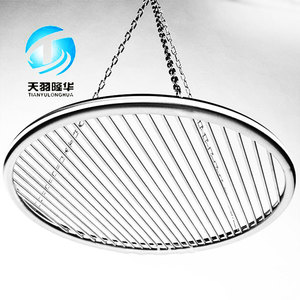



























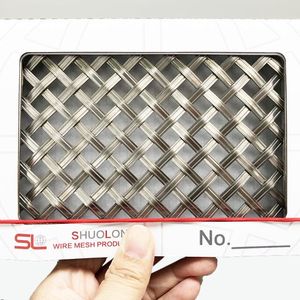










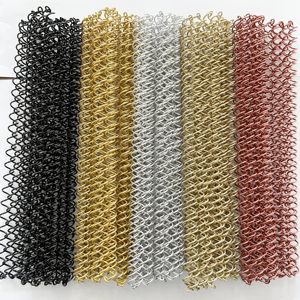


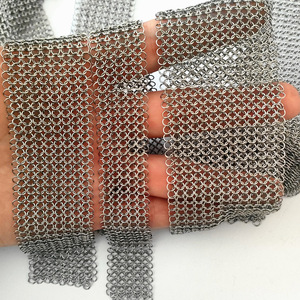



Metal mesh strips are manufactured in multiple types. Some of the types are staple type, welding type, hook and loop type, magnetic type, and fiber reinforced type.
Stainless steel mesh strips are manufactured using rust-free stainless steel. Thus, the strips are strong, lightweight, and a long-term option for adhesion masking protection. The metal mesh strips are used in highly corrosive environments and mechanical applications. In addition, he offers excellent durability, heat resistance, and flawless adhesion. Also, stainless steel strips effectively add to surface protection, offering a perfect balance of toughness and precision for industrial usage.
Brass mesh strips combine aesthetics with practicality. Often used in electrical applications because of its non-magnetic qualities. Moreover, brass offers great flexibility and corrosion resistance. The precision-engineered strips ensure solid and secure bonding surfaces. These strips are ideal for crafts, capillary action in fluid systems, and uses where conductivity and durability go hand in hand. In addition, their distinctive gold-like appearance means they can also be used in decorative applications.
Aluminium mesh strips are lightweight. These include easy handling and excellent resistance to atmospheric corrosion. Often used in construction and automotive industries. They provide reliable masking in environments exposed to elements. These include heat and moisture. Also, their adaptability and ease in customisation make these strips a preferred alternative for insulation, impermeability, and surface protection. The strips give an outstanding balance between lightweight and durability, making them ideal for multiple applications.
Copper mesh strips are flexible, extremely malleable, and offer unmatched conductivity. Often used in electrical and thermal applications. Moreover, the metal strips are ideal for shielding, grounding, and bonding. Also, the resistance to corrosion means long-term reliability in exposed environments. Often these strips are utilised in fine mechanical components, electronic devices, and systems that demand superior conductivity. They provide excellent performance to users and support robust engineering designs.
These strips are manufactured using titanium alloy. This is a strong, lightweight, and highly corrosion-resistant material. It is used in the most demanding applications. This includes aerospace and biomedical fields. Also, titanium mesh strips are used to provide exceptional durability while still extremely lightweight. It is resistant to fatigue and worn. These metal mesh strips are ideal for use in the most challenging environment due to their strength and resistance to chemical corrosion.
The durability and merit of the metal mesh strips are conditioned by corrosion resistance, materials used, and tensile strength.
Corrosion resistance
Great resistance is vital for longevity in outdoor and industrial uses in such a way that corrosion is among the most common threats to durability. Moreover, stainless steel, copper, and brass strips boast exceptional corrosion resistance. They function well in exposed environments. These include marine and chemical plants. Also, maintenance is minimal in the stainless steel mesh strips, and the copper meshes are easily cleaned and maintained, which is advantageous in high-terrain applications.
Materials
Metal mesh strips are manufactured using various materials. Each has pros. In most instances, users use stainless steel for strength and corrosion resistance. Steel mesh strips are also used for easy manipulation and versatility. Copper offers great electrical conductivity. Also, Users prefer brass for good corrosion resistance and conductivity.
Lastly, titanium is used where extreme toughness and corrosion resistance are needed. Also, aluminium is used for lightweight and easy fabrication.
Mesh design and tensile strength
The durability of the metal mesh strips is greatly conditioned by the design of the mesh. Also, tightly woven or welded designs ensure great tensile strength. This can support heavy loads without stretching or deforming. Additionally, quality welding or bindings between strands provide added security in heightened-stress environments. Moreover, well-constructed metal mesh strips maintain integrity during installation, meaning they are applied in long-term service.
Metal mesh strips have various applications in industrial and commercial settings. Users use them for surface protection. They create a barrier that holds contaminants such as dust, debris, and moisture at bay. Moreover, they are ideal for masking in electroplating and painting. These include critical applications where precision is mandatory. They prevent unwanted substances from depositing on areas where coating is not required.
The strips securely fasten components and provide structural reinforcement. Also, in automotive and aerospace industries, lightweight yet strong materials are needed. Metal mesh strips satisfy this demand by increasing the strength of a given area and lessing the chances of it getting warped. Also, they contribute to heat insulation in engine compartments and other areas with intense heat. This helps protect wiring and other parts from getting damaged.
Users commonly use metal mesh strips to make viable filter media in chemical processing, water treatment, and air purification. In these spaces, the durability of the mesh is more vital than its chemical resistance. This means that the strips should have high tensile strength, corrosion-resistant materials, and a design that prevents clogging while allowing efficient flow. Moreover, the precision and reliability of metal mesh strips make them ideal for the filtration market.
In buildings and infrastructure, metal mesh strips reinforce concrete and secure electrical wiring within walls. Also, they play a huge role in protecting surfaces during construction. This includes covering areas to prevent damage during transport or installation. Furthermore, inhabilitation management, metal mesh strips make guards and barriers work in safety equipment, ensuring they meet the highest safety standards.
Users use metal mesh strips in the electronics industry for shielding purposes. This prevents electromagnetic interference (EMI) in devices such as telecommunication equipment and medical devices. Further, their conductivity and flexibility make them fit for grounding applications where they help to disperse static electricity and reduce the risk of damage to sensitive components. Also, their precision during manufacture ensures consistency and reliability in the performance of electronic devices.
Buyers consider various factors when buying metal mesh strips. Here are some of those factors.
Purpose
The primary application of a buyer determines the type of metal used in the mesh strip. For instance, stainless steel is ideal for outdoor and industrial applications requiring corrosion resistance and durability. Besides, copper is more suited for electrical applications due to its superior conductivity. Also, brass offers a balance of strength and corrosion resistance. Furthermore, titanium is the go-to for applications requiring extreme strength without adding long weights.
Chemical resistance
Buyers consider the environment in which the mesh strips will be used. Preference goes to marine or chemical environments to utilise metals with high chemical stability, such as stainless steel and titanium. For interior applications, brass or aluminium may suffice.
Mesh design
The durability and functionality of the mesh strips are affected by the design of the mesh. Tighter weaves or higher strand diameters offer greater tensile strength and flexibility. In addition, buyers evaluate the welding quality or the method used to join the strands. This affects the overall integrity of the strips.
Size and Customisation
Buyers know the required dimensions in terms of width, length, and wire gauge. They check if the manufacturer can offer customised mesh strips to meet specific project needs. These include unique sizes or mesh patterns. Also, they assess the availability of additional treatments or coatings. They improve the performance of the strips.
Cost
Although price is an important factor, buyers do not compromise on quality. They compare the prices of various manufacturers and evaluate the long-term benefits of each material. These include maintenance costs.
Buyers use stainless steel most of the time because of its good strength and resistance to rust. It works great for tough jobs where the strips have to put up with bad weather or chemicals. Also, stainless steel is super flexible and precise, so it fits in a lot of projects. Many people also like copper, brass, aluminium, and titanium for various jobs. Each metal has unique properties that make it perfect for specific challenges.
For industrial uses, metal mesh strips are fixed with strong adhesives, welds, or mechanical fasteners. People choose the right way to attach them based on what the metal strips will go through. They consider the strain, temperature, and chemicals in each application. This ensures the strips stay securely in place, even in tough environments.
These mesh strips handle heat really well. Copper, brass, and aluminium gain temperatures, but they are not affected. Stainless steel holds up against heat and oxidation. On the other hand, titanium is excellent in very high-heat situations. People pick the best metal for their projects based on how hot it will get.
Usually, the life span of these strips comes in handy. It depends on how people use them and what kind of environment they are in. If they're protected from bad weather and chemicals, they can last many years. Some even hold up for decades in construction projects. To make them last longer, people should use stainless steel, titanium, and, occasionally, copper. Keeping them clean also helps a lot.